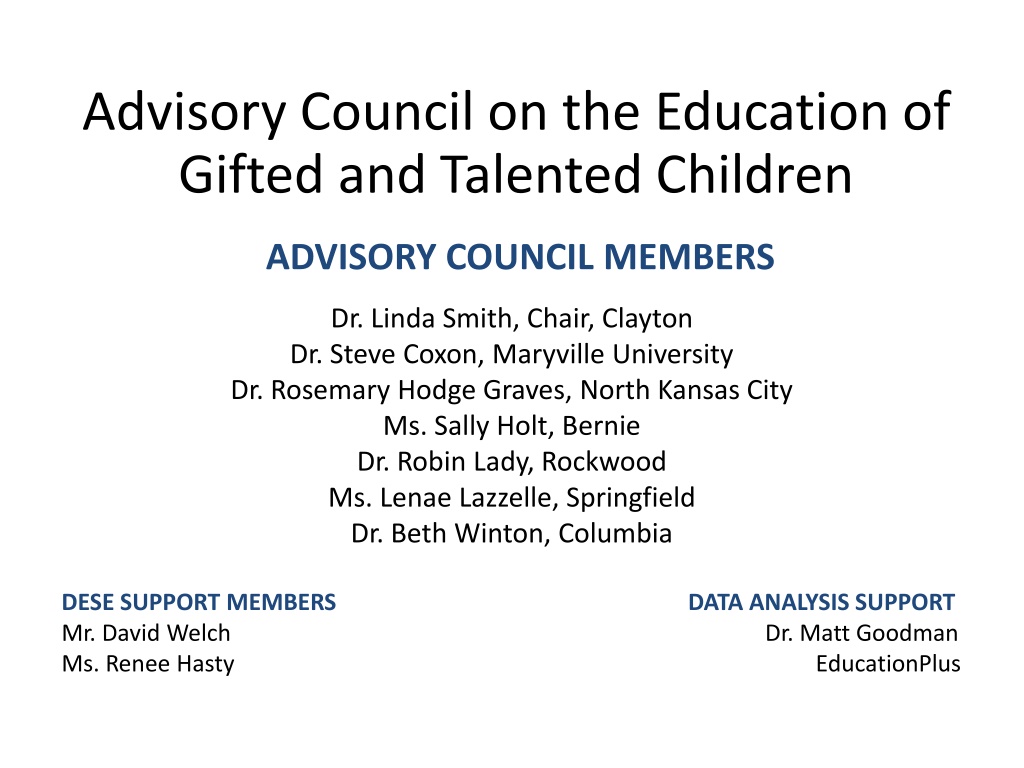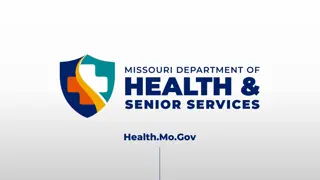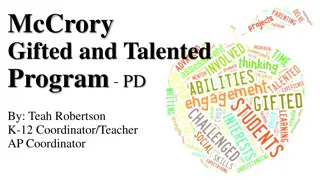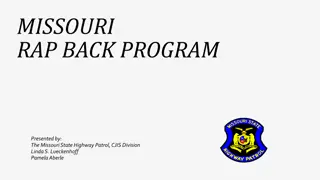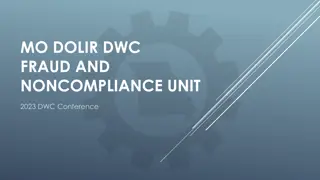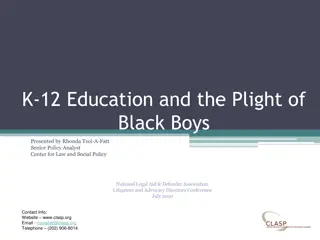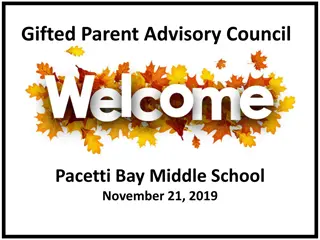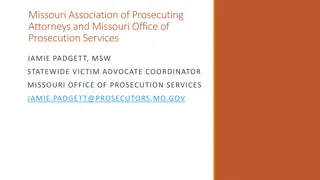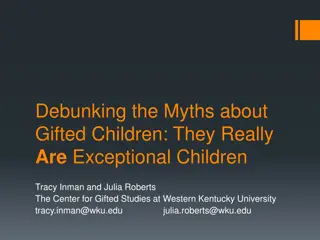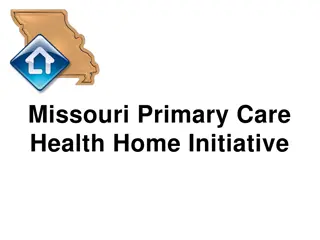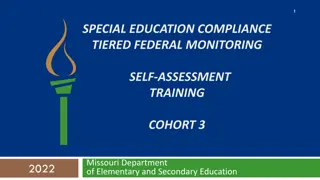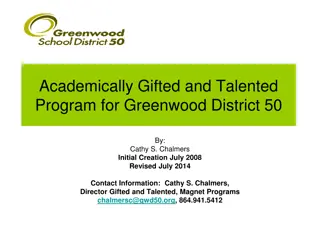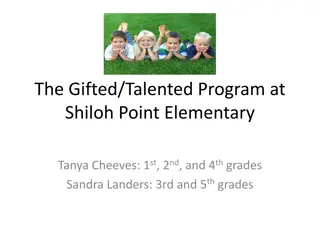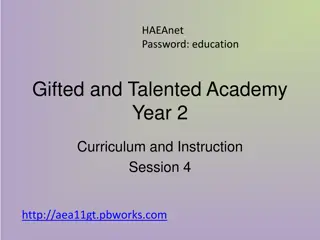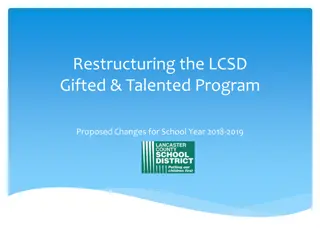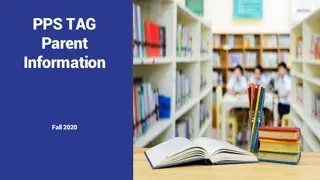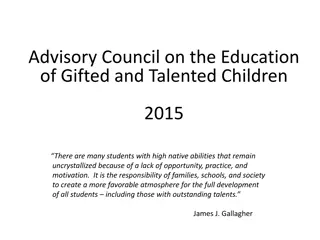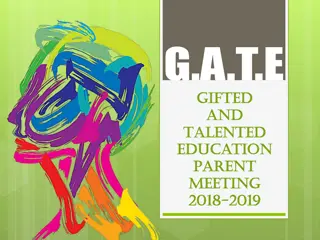Analysis of Gifted Education Programs in Missouri
The Advisory Council on the Education of Gifted and Talented Children in Missouri was established in 2013 to provide expert advice on rules and policies related to gifted education. The council aims to create a data-driven understanding of current gifted programs, make recommendations for improvement, and set baselines for future analyses. An analysis of the current status shows the percentage of gifted students served compared to the student population, highlighting areas for growth. Moreover, Missouri's comparison with border states reveals gaps in gifted mandates and funding.
Download Presentation

Please find below an Image/Link to download the presentation.
The content on the website is provided AS IS for your information and personal use only. It may not be sold, licensed, or shared on other websites without obtaining consent from the author.If you encounter any issues during the download, it is possible that the publisher has removed the file from their server.
You are allowed to download the files provided on this website for personal or commercial use, subject to the condition that they are used lawfully. All files are the property of their respective owners.
The content on the website is provided AS IS for your information and personal use only. It may not be sold, licensed, or shared on other websites without obtaining consent from the author.
E N D
Presentation Transcript
Advisory Council on the Education of Gifted and Talented Children ADVISORY COUNCIL MEMBERS Dr. Linda Smith, Chair, Clayton Dr. Steve Coxon, Maryville University Dr. Rosemary Hodge Graves, North Kansas City Ms. Sally Holt, Bernie Dr. Robin Lady, Rockwood Ms. Lenae Lazzelle, Springfield Dr. Beth Winton, Columbia DESE SUPPORT MEMBERS DATA ANALYSIS SUPPORT Mr. David Welch Dr. Matt Goodman Ms. Renee Hasty EducationPlus
COUNCIL BACKGROUND Established in 2013 after passage of State Statute 161.249 by the Missouri legislature Composed of seven Missouri residents with expertise in gifted education Members appointed by the Commissioner of Education Responsible for providing advice regarding all rules and policies to be adopted by the State Board of Education relating to the education of gifted and talented children in Missouri. GOALS OF REPORT GOAL 1: Create a data-driven understanding of the current status of gifted programs in the state. GOAL 2: Make recommendations for improvement in Missouri s efforts related to gifted and talented children. GOAL 3: Establish a baseline for future analyses and recommendations.
Analysis of Current Gifted Served Compared to 5% and 10% of Student Population 5% 10% 2014 Actual Gifted Students Identified and Served 2014 Current Percent of Students Identified and Served 2014 Missouri Public School Students Additional Students to Reach 5% Additional Students to Reach 10% Students Identified and Served Percent Increase to Reach 5% Students Identified and Served Percent Increase to Reach 10% Region A-St. Louis 265,211 19,252 7.3% 13,261 26,521 7,269 38% B-Kansas City 175,034 7,568 4.3% 8,752 1,184 16% 17,503 9,935 131% C- 141,931 4,845 3.4% 7,097 2,252 47% 14,193 9,348 193% Southwest D-Central 79,368 3,643 4.6% 3,968 325 9% 7,937 4,294 118% E- 65,584 1,503 2.3% 3,279 1,776 118% 6,558 5,055 336% Southeast F-West Central 38,241 703 1.8% 1,912 1,209 172% 3,824 3,121 444% G-South Central 57,345 1,534 2.7% 2,867 1,333 87% 5,735 4,201 274% H- 34,007 876 2.6% 1,700 824 94% 3,401 2,525 288% Northwest I-Northeast 28,555 842 2.9% 1,428 586 70% 2,856 2,014 239% MISSOURI TOTAL 885,276 40,766 4.6% 44,264 9,489 23% 88,528 47,762 117%
COMPARISON STATES In comparison with border states, only Missouri and Illinois do not have a gifted mandate or earmarked funds for gifted programming. In Iowa and Oklahoma, gifted programming is mandated and fully funded by the state. In Kansas, Arkansas, Tennessee and Kentucky, gifted programming is mandated and partially funded by the state. In Nebraska, gifted programming is not mandated but has funds available for gifted programming. Of the Top 10 by 20 DESE comparison states, seven have a mandate for gifted programming. Those states are Connecticut, Maine, Minnesota, Montana, New Jersey, Virginia and Wisconsin. Only Massachusetts, New York and Vermont have no mandate. Five of the states have partial funding for gifted programming. Those states are Maine, Minnesota, New Jersey, Virginia and Wisconsin.
RECOMMENDATIONS The report concludes with 10 recommendations for action, grouped into five broad areas: Reporting data on gifted students and programs Identification of gifted students Programming for gifted students Educator preparation and professional development Requiring and funding gifted education Report Pages: 37-43 Format: Problem Recommendation Rationale
